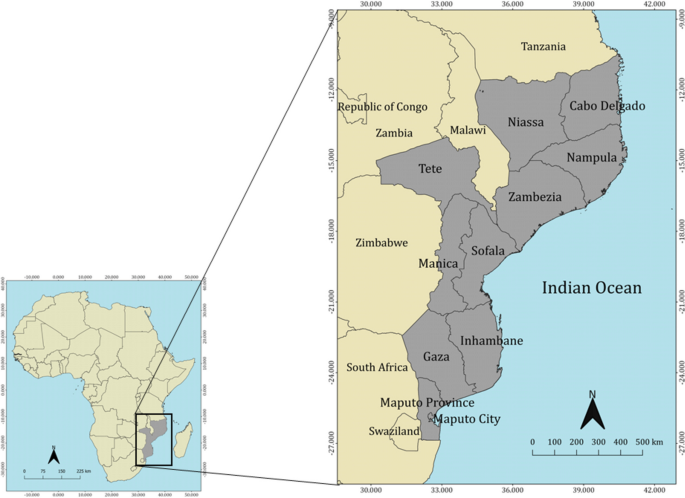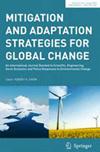不同气候情景下的农业系统变化及其对粮食安全的影响:为发展中国家适应政策提供信息的分析框架
IF 2.7
3区 环境科学与生态学
Q3 ENVIRONMENTAL SCIENCES
Mitigation and Adaptation Strategies for Global Change
Pub Date : 2023-09-25
DOI:10.1007/s11027-023-10082-5
引用次数: 0
摘要
发展中国家由于其社会经济背景(高度贫困)和生计对自然资源的高度依赖,被认为极易受到气候变化的影响。这些国家的农村地区集中了世界上大多数最贫困和粮食不安全的人口,农民是最容易受到气候变化影响的群体之一。预计气候变化的影响具有空间异质性。从这个意义上讲,本文旨在利用时空方法探讨气候变化对莫桑比克农业制度选择的直接边际效应及其对粮食安全的影响。研究结果表明,气候变化将导致农业制度选择及其空间分布发生重大变化,并可能影响小农的生计和粮食安全状况。包括粮食/经济作物和/或牲畜在内的农业系统是粮食最安全的,在所有气候情景下,它们往往会被其他系统所取代。混合农业系统(包括粮食和牲畜)和以牲畜为导向的系统,主要是粮食不安全的,主要在干旱地区,预计将随着气候变化而扩大。根据建模结果绘制了粮食安全和创新压力图,确定了公共干预的优先领域。我们还强调,我们的方法如何能够成为一个有效和易于复制的框架,以解决面临类似问题的其他发展中地区的这类问题。本文章由计算机程序翻译,如有差异,请以英文原文为准。

Farming system change under different climate scenarios and its impact on food security: an analytical framework to inform adaptation policy in developing countries
Abstract Developing countries are considered extremely vulnerable to climate change, due to their socioeconomic context (high levels of poverty) and high dependence of their livelihoods on natural resources. Rural areas in these countries concentrate most of the poorest and food-insecure people in the world, with farmers being among the most vulnerable to climate change. The impacts of climate change are expected to be spatially heterogeneous. In this sense, this paper aims at exploring the direct, marginal effect of climate change on farming system choice and its implications to food security in Mozambique, using a space-for-time approach. Our results suggest that major changes are to be expected in farming system choice and their spatial distribution due to climate change, which will potentially impact the livelihoods and food security status of smallholder farmers. Farming systems including food/cash crops and/or livestock, which are among the most food secure, will tend to be replaced by other systems in all climate scenarios. Mixed farming systems (including food and livestock) and livestock-oriented systems, mostly food insecure, predominant in arid areas are expected to expand with climate change. Food security and innovation stress maps were sketched out from the modelling results, identifying priority areas for public intervention. We also highlight how our approach can be an effective and easily replicable framework to address this type of issues in other developing regions facing similar problems.
求助全文
通过发布文献求助,成功后即可免费获取论文全文。
去求助
来源期刊

Mitigation and Adaptation Strategies for Global Change
ENVIRONMENTAL SCIENCES-
CiteScore
6.60
自引率
0.00%
发文量
50
审稿时长
3 months
期刊介绍:
The Earth''s biosphere is being transformed by various anthropogenic activities. Mitigation and Adaptation Strategies for Global Change addresses a wide range of environment, economic and energy topics and timely issues including global climate change, stratospheric ozone depletion, acid deposition, eutrophication of terrestrial and aquatic ecosystems, species extinction and loss of biological diversity, deforestation and forest degradation, desertification, soil resource degradation, land-use change, sea level rise, destruction of coastal zones, depletion of fresh water and marine fisheries, loss of wetlands and riparian zones and hazardous waste management.
Response options to mitigate these threats or to adapt to changing environs are needed to ensure a sustainable biosphere for all forms of life. To that end, Mitigation and Adaptation Strategies for Global Change provides a forum to encourage the conceptualization, critical examination and debate regarding response options. The aim of this journal is to provide a forum to review, analyze and stimulate the development, testing and implementation of mitigation and adaptation strategies at regional, national and global scales. One of the primary goals of this journal is to contribute to real-time policy analysis and development as national and international policies and agreements are discussed and promulgated.
 求助内容:
求助内容: 应助结果提醒方式:
应助结果提醒方式:


